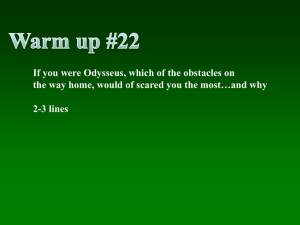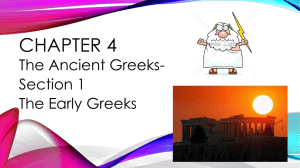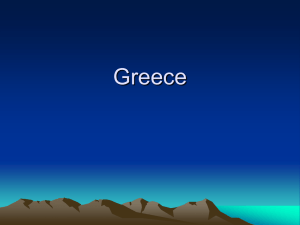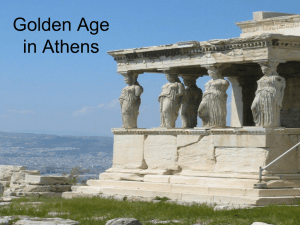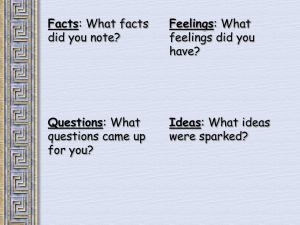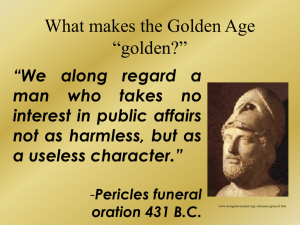Athens - wchsfurr
advertisement
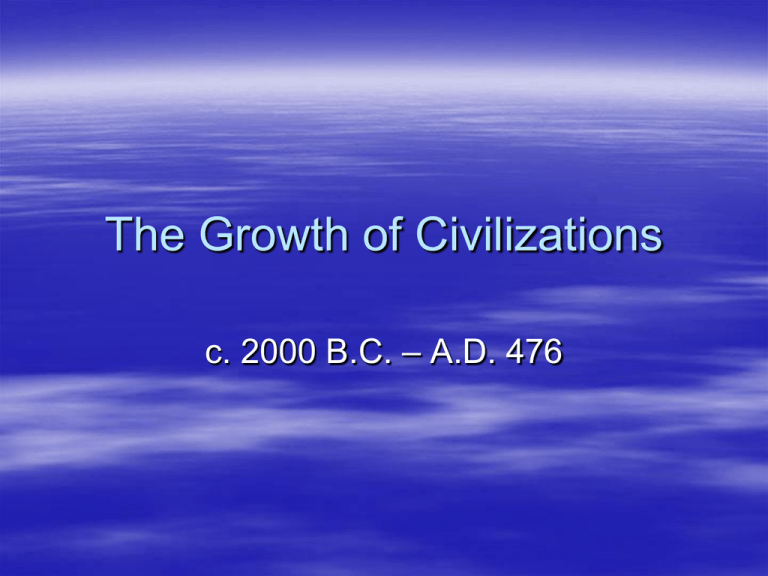
The Growth of Civilizations c. 2000 B.C. – A.D. 476 Greece www.portoveneziano.gr/ crete-map-en.jsp Geographically Southern part of the Balkan Peninsula Key geographical feature … Aegean Sea www.hfac.uh.edu/ mcl/classics/greec.jpg Most jobs of Greek civilization were sea based – Traders – Fishermen Early Greek Peoples Minoans www.cretashop.gr/br/ imagesbr/minoan%20fresco.gif Located on island of Crete Economy – trade Volcano 1628 – empire starts to decline Defeated by the Mycenaeans Map of Ancient Greece This map shows the Greek settlements c550 BC Mycenaeans www.wsu.edu:8080/.../ MODULES/MINOA/TITLE2.GIF Located on Greek mainland Controlled Greece from 1600-1200 B.C. Greek City-States Polis – A Greek city-state Characteristics of city-states Small (in terms of land) Populations of < 10,000 Forts built on hills of cities (Acropolis) Agora= Market Politically independent Greek speaking Saw non-Greeks as barbarians Religious Life Religion was used to explain nature Used to explain why emotions caused people to lose control Explains the unexplainable Gods have human qualities Benefits:Long life / Good afterlife experience – Good Fortune – Good harvests Greek Gods Zeus www.madisonastro.org/ astrophotos/play/zeus.gif Chief God Lived on Mount Olympus Apollo www.students.sbc.edu/.../ apollo%20belvedere.jpg Son of Zeus God of Light Athena web.mit.edu/.../www/ Europe2002/080402/Athena.JPG Daughter of Zeus Protector of Athens Goddess of Wisdom and Womanly Goodness Dionysus brainstorm-services.com/ wcu-lit/oedipus-stept... God of fertility and wine Hermes www.watson.org/~leigh/hermes.jpg Messenger of the Gods Also the god of thieves, travelers, shepherds, and merchants Ares www.eduteka.org/proyectos/psique/images/ares.jpg God of War Greek God Family Tree www.angelfire.com/.../ familytree.html Governing City-States Each city-state ruled by a chieftain from hilltop fortresses Needed wealthy nobles because they had money to buy chariots, horses,and weapons to fight Thus, the aristocracy (rule by the upper class) was born Sparta vs. Athens Sparta Located on Peloponnesus Militaristic – Whole life built around it Class system – Equals – decended from invaders – rulers – Half-Citizens – Helots - slaves Ruled by two kings/Council of Elders Boys and Girls attend school Athens Located on the Attic Peninsula Mostly sea traders Society – Citizens – All Athenian born men, only male education – Metics – born outside – paid taxes – but could not participate in gov’t or own land – Slaves Early government – Governed by nine archons The Four Founding Dictators Draco www.auburn.edu/~downejm/ sp/alpcontents.html Believed to have created Athen’s first code of law Law harsh and severe Any laws now considered harsh today are referred to as “Draconian” Solon www.nimispauci.com/ Laerce/SeptSages/Solon.jpg Erased debt of poor Settled disputes between rich and poor Outlawed slavery for debt Peisistratus www.learnline.de/angebote/ realideal/apotheose... Ruled Athens as tyrant with support of lower classes Economy improved Cleisthenes www.pbs.org/.../characters/ cleisthenes_p8.html Began democracy in Athens – Divided Athens’ citizens into 10 tribes they chose 50 representatives -> formed Council of Five Hundred Greek Expansion Persian Wars 500-479 B.C. Trouble begins in… ccwf.cc.utexas.edu/ ~perlman/myth/lecture15.html Ionia, a Greek Colony Conquered by Persians Ionian (Greek citizens in Asia Minor) rebel against Persian rule. Rebellion crushed – but…. Darius home.att.net/ ~tabriz/newpage1.htm Wanted to punish Athens for the rebellion Invade Greece 1st major battle… Battle of Marathon 490 B.C. Major upset – Athenians although outnumbered win Phalanx Role of Pheidippides Second Invasion www.2frompars.com/ Xerxes%20(Khashayar%20Shah).htm 480 B.C. This one led by Xerxes, son of Darius Two major battles – Battle of Thermopylae – Battle of Salamis Battle of Thermopylae www.barca.fsnet.co.uk/ punic2-after-greece.htm Land battle which united all Greeks Persians attack through narrow mountain passeventually find way around 300 Spartan soldiers killed while Athenians returned home to save Athens joseph_pod.com/.../ id28.html Battle of Salamis www.livius.org/he-hg/ herodotus/logos8_24.html Naval Battle of coast of the island of Salamis Athens won because their smaller ships were more mobile than the larger Persian ships Major victory for Athens Effects of the Persian Wars Persia weakens – no longer the power of the area Athenian power increases – leader of the new Delian League (league of independent Greek city-states) purpose was the protection of each of the city-states Athens got rich – from Delian League monies Delian League This Organization was formed by Athens to Rule over other City States Members had to pool their money in Athenian banks Members relied on Athenian Military defense Members had to use Athenian laws Age of Pericles 24.24.31.212/literature/ POL-HS-Pericles.htm 1st citizen of Greece – world Began massive building projects – Parthenon Took democracy to a new level Used Delian League money for building projects The Peloponnesian War Sparta vs. Athens 431 B.C. – 404 B.C. Strengths Sparta Had greatest army in Greece Had won over allies opposed to Athenian Delian League Athens Had the strongest navy in Greece Had allies through Delian League Had Allies through fear of Sparta. Purpose of War The Peloponnesus (Sparta) and Athens were both full of young men whose inexperience made them eager to take up arms. Thucydides Early Years of War Sparta begins invasion of Attica Peninsula Athenians withdraw behind walls of city Most cities would be besieged – but not Athens – Great Navy – Long Walls Athens is decimated by a plague – killing thousands including Pericles Athens begins to fall Athens attacks Syracuse (Sicily) – driven back – begins downward spiral of Athens Aristocracy overthrown – democracy restored – government weakened Eventually food supply cut off – Athens forced to surrender in 404 B.C. Effects of the Peloponnesian Wars Greece becomes politically unstable Athens becomes second class city Sparta and Thebes try unsuccessfully to unite Greece Will eventually be united by an outside power Greece’s Golden Age The Arts Architecture Showed the love of beauty in the buildings – Temples – gymnasiums – Theatres Types of architecture are still used today Examples…. Theatre in Athens www.spudles.com/travels/ Europe2002Pics/Athens... Painting Most original artwork has been lost or destroyed Pottery was two toned using a combination of black, ochre (red), yellow, or orange. Pottery and paintings recorded events, scenes of life, or mythology. Sculpture Greatest sculptors= beauty of body-nudes, mythology – Myron The Discus Thrower – Phidias Zeus – Praxiteles Showed Greek love for the human body Greek Ideals Expressed in Art in four ways: 1. Greek art glorified human beings 2. Art of Golden Age symbolized Greek pride in their city-states 3. Expressed Greek beliefs in harmony, order, and moderation 4. Expressed the Greek belief in combining beauty and usefulness Greek Philosophers Lovers of Wisdom Socrates lilt.ilstu.edu/jhreid/frenchculture/socrates.jpg Fell victim of frustrations of Athens’ loss in the Peloponnesian War Forced to drink hemlock for “corrupting the minds of youth” Best known for Socratic Method= teach by asking questions Plato www.uh.edu/~cfreelan/courses/Plato.JPEG Began school called the Academy – continues for 900 years Believed in an aristocracy Student of Socrates but disagreed with his teachings Aristotle www.hao.ucar.edu/.../ sp/images/aristotle.html Student of Plato Based everything on logical thought and processes Emphasized science and nature Mathematics Pythagoras www.uncletaz.com/norsktaz/pythagoras.jpg Came up with the Pythagorean Theory A2 + B2 = C2 Euclid Father of Geometry Medicine Hippocrates historical-studies.ncl.ac.uk/images/aux_images/hippocrates.jpg Father of Medicine Hippocratic Oath History Herodotus www.losttrails.com/media/Herodotus/athens35-30b.jpg First known historian Used stories handed down through time Thucydides www.livius.org/a/1/greeks/thucydides.jpg Historian whose greatest works surround the Peloponnesian War Differed from Herodotus by using primary sources and recording stories from veterans of the war Drama Tragedies --day Comedies– night Entertainment and worship Macedonian Conquests of Greece Phillip II of Macedon etc.usf.edu/clipart/1200/1254/philip2_1_lg.gif Called on by Isocrates (Greek Philosopher) to invade Greece for the purposes of unification Became Macedonian king in 359 B.C. Builds great army – New phalanx Begins take over of Greece Downfall of Phillip II 337 B.C. Phil divorces wife and mother of Alexander and marries daughter of high ranking noble who has son to challenge Alexander’s right to throne Former guardsman, Pausanias stabs Phillip Alexander takes the throne Alexander the Great and his horse Beusephalis murugan.org/research/alexander-m.jpg Builds great empire – South to Egypt and east to India Spreads Hellenistic culture – Combination of Greek and eastern customs Dies in 328 B.C. after ruling only 12 years and 8 months Empire begins to dismantle Alexander’s Empire www.ancientanatolia.com/historical/maps/Image1b.gif Hellenistic Achievements Architecture Alexanderia, Egypt www.touregypt.net/village/alex3.jpg Astronomy and Geography


